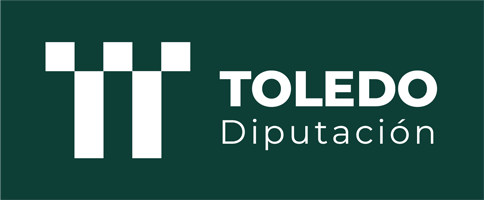

Full project name:
Erasmus Mundus Joint Master in Healthy and Active Ageing
Project acronym: AGErasmus



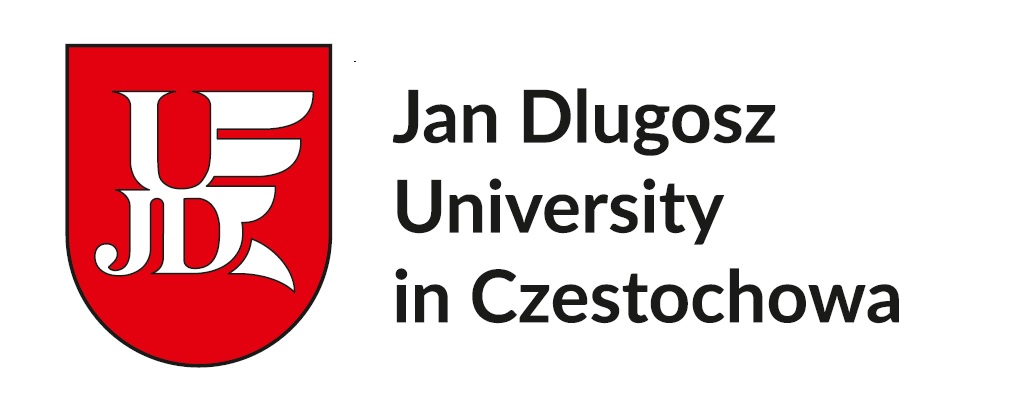


The AGErasmus EMJM aims to provide graduates with a holistic approach, relevant knowledge and competences and the required skills to work as qualified professionals in healthy and active ageing by designing and applying preventing and therapeutic interventions in either the clinical (Hospital geriatric departments) or socio-healthcare fields (public services for older adults and nursing homes).

In four different European Union universities (Spain, France, Poland, and Portugal), with lectures and seminars taught both by academics of the highest scientific level and by practitioners in exercise science in older populations, geriatrics, gerontology also from socio sanitary contexts.
- UNIVERSIDAD DE CASTILLA-LA MANCHA (Spain)
- UNIVERSIDADE DE LISBOA (Portugal)
- JAN DLUGOSZ UNIVERSITY IN CZESTOCHOWA (Poland)
- UNIVERSITE LE MANS (France)
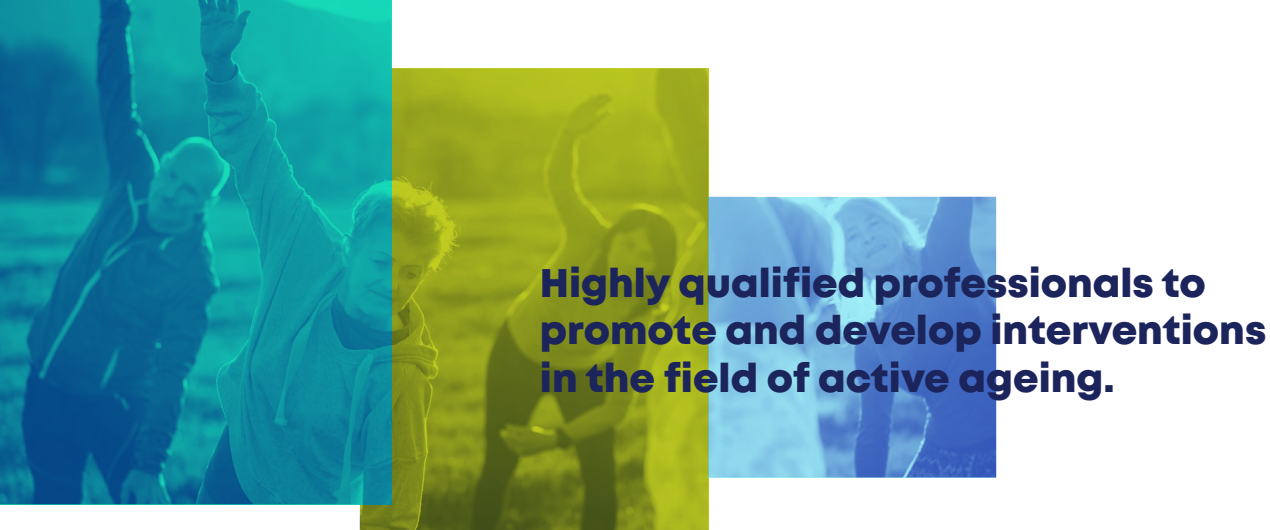

Applicants must have a bachelor’s degree (at least 180 ECTS) or be in their last year of bachelor studies and graduate before the master’s programme starts.
There will be priority to graduate students with:
- Bachelor in Sports Sciences
- Bachelor or Master’s degree in Medicine
- Bachelor in Nursing
- Bachelor in Dietetics and Nutrition
- Bachelor or Master’s degree in Physiotherapy

There are scholarships for students to take part in the AGErasmus Master, offered to the best-ranked applicants worldwide. Scholarships will cover the cost of a student’s participation in the programme, travel and a living allowance.

There is compulsory mobility, which comprises 4 study periods in at least 3 different countries.
All the students will start the Master’s semester 1 in Spain, followed by semester 2 in Portugal and finally, for semester 3, all students will be allocated to either Poland or France , depending on their preference on a Nutrition-applied track (Poland) or a Psycho-social-applied track (France). Semester 4 will be dedicated to the Master thesis project and a one-month internship.


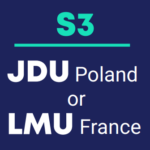

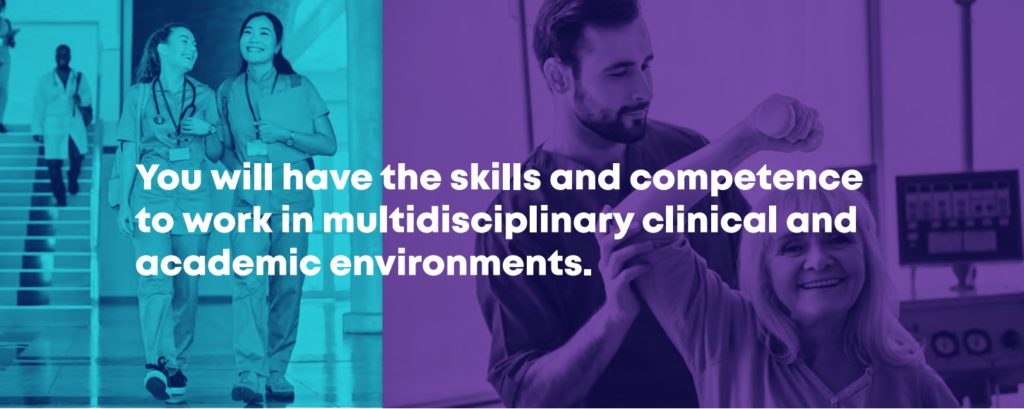

We have designed a 2-year, 120 ECTS, study programme in the field on active and healthy ageing, with 12 modules, spread over four academic semesters:
MODULE: FUNDAMENTALS OF HEALTHY AGEING: FRAMEWORK AND BASIC CONCEPTS (6 ECTS)
Both courses of “Introduction to the Biology, Context and Framework of Healthy Ageing” (3 ECTS) and “Determinants of intrinsic capacity (3 ECTS)” will help to establish the basic concepts of healthy ageing and serve as a starting point for the variety of students to begin their studies, along with the global perspectives on ageing and health. The concept of intrinsic capacity and its importance for healthy ageing will be specifically introduced. It will also cover the molecular and cellular mechanisms that underlie the ageing process, as well as the ways in which these mechanisms can be manipulated to promote healthy ageing. The role of oxidative stress and inflammation in aging, the impact of lifestyle factors such as diet and exercise on aging at the cellular level and the impact of aging on organ function will also be addressed.
MODULE: FUNDAMENTALS OF EXERCISE, NUTRITIONAL, TECHNOLOGICAL AND PYCHO-SOCIAL INTERVENTIONS IN AGEING (24 ECTS)
Split between Semesters 1 and 4, will serve as the introduction and common background for the four main topics of the AGErasmus EMJM: exercise, technology, cognitive and psycho-social aspects of ageing and nutrition. The teaching load will be also distributed between the four partner HEIs, with the following courses addressing the fundamentals of each topic: “Assessment of body composition and exercise metabolism” (4 ECTS) and “Assessment of muscle health, sarcopenia and physical function in older adults” (4 ECTS) for exercise, “Emerging technologies in the promotion of physical activity and health” (2 ECTS) and “Personalized exercise medicine for older adults: opportunities for digital interventions” (6 ECTS) for technology, “Fundamentals of psychological and social interventions in ageing” (4 ECTS) for cognitive and psycho-social aspects of ageing and “Fundamentals of nutritional interventions in ageing” (4 ECTS) for nutrition.
MODULE: POLICIES, ENVIRONMENTS AND DESIGN FOR HEALTHY AGEING (6 ECTS)
This module will examine the intersection of policies, stakeholders, and the built environment in shaping the ageing experience. It also will explore global and regional strategies for healthy ageing, the role of governments and NGOs, and key aspects of healthcare and social security (“Agents and policies in healthy ageing”, 4 ECTS). The impact of architecture and urban planning will be analysed through concepts like age-friendly cities, universal design, and intergenerational living. A special focus will be given to the Bauhaus movement, whose functional and human-centered principles continue to influence inclusive design. The module will also explore smart cities and technology-enhanced spaces that promote autonomy and well-being in later life (“Environmental factors of ageing”, 2 ECTS). The teaching load of this module will be distributed between UCLM and ULisboa in Semesters 1 and 2
MODULE: EPIDEMIOLOGY AND GENETICS OF AGEING (6 ECTS):
This module, developed in Semesters 1 and 2 by UCLM. The course “Concepts in epidemiological research” (3 ECTS) will focus on the history, framework, key concepts in epidemiology, models in physical activity epidemiology, the Lancet physical activity series, frequency measures, measures of association, attributable risk and cause and effect. “Genetic and epigenetic variation in ageing” (3 ECTS) course will emphasise on the role of genetic variation in ageing and age-related diseases, the interplay between genetic and epigenetic variation in ageing, the impact of environmental factors on genetic and epigenetic variation in ageing and the potential use of genetic and epigenetic information in personalized medicine and ageing interventions.
MODULE: RESEARCH METHODOLOGY AND DATA ANALYSIS (6 ECTS)
It will be developed in semester 1 (1 ECTS) and semester 2 (5 ECTS). This module will cover a range of topics related to designing, conducting, and analysing research studies in the field of medicine and health. Furthermore, it will delve into the introduction to different research designs, ethics in research, sampling techniques and power calculations, measurement and assessment techniques, data analysis and statistics, literature review and manuscript writing and the presentation of research findings.
MODULE: EXERCISE FOR HEALTHY AGEING (10 ECTS)
It will be developed in Semester 1 and 3 by UCLM. This module will focus on the conception and development of exercise programs for older adults, with specific attention on exercise for frail older adults without non-communicable diseases. The module will also cover the principles of exercise prescription and special considerations for older adults with non-communicable diseases such as endocrine and metabolic diseases, cardiovascular diseases, neurodegenerative diseases, cancer, and respiratory diseases. It will also address the potential benefits of exercise for these populations and how to implement the exercise programs accordingly. The courses that integrate the module are “Principles of exercise prescription for a successful ageing” (6 ECTS) and “Multicomponent exercise programmes for frail and vulnerable populations” (4 ECTS).
MODULE: NEW TECHNOLOGIES, DIGITAL PHENOTYPING AND eHEALTH (10 ECTS)
will be taught by ULisboa during semesters 2 and 3, and will focus on the study of mobility in relation to environmental factors, digital phenotyping, and new technologies for older adults. It will also explore into the concept, applications, and potential of digital phenotyping. Additionally, the module will examine the effects of monitoring systems on healthcare policies and explores the use of e-health and m-health interventions for seniors. The courses within this module are “Digital phenotyping in surveillance and monitoring systems” (6 ECTS) and “Correlates and determinants for physical fitness and 24-hour movement behaviours” (4 ECTS).
MODULE: NUTRITION AND HEALTHY AGEING (Optional, TRACK 1) (22 ECTS)
Optional module that will be completely developed in semester 3 by JDU. This module will explore the role of nutrition in promoting healthy ageing, addressing both physiological and dietary needs specific to older adults. Students will learn about the relationship between nutrition and lifestyle diseases, as well as strategies for dietary modifications in various health conditions such as diabetes, cardiovascular diseases, and cancer. Through a combination of theoretical insights and practical applications, students will gain a comprehensive understanding of how nutrition influences longevity and quality of life in older populations. Courses included in this module are “Sustainable nutrition for healthy ageing” (4 ECTS), “Physiology and appetite disorders in ageing“ (3 ECTS), «Functional foods, dietary supplements and nutritional pharmacotherapy for healthy ageing” (4 ECTS), “Innovative protein sources for healthy ageing” (4 ECTS), “Nutritional prehabilitation and gut microbiota during ageing” (3 ECTS) and “Nutritional psychology and coaching “ (4 ECTS).
MODULE AGEING, COGNITIVE FUNCTIONS, AND ADAPTED PHYSICAL ACTIVITY: PRINCIPLES AND PRACTICES FOR ENHANCING HEALTH AND AUTONOMY IN OLDER ADULTS (Optional, TRACK 2) (22 ECTS)
Optional module developed in semester 3 by LMU. This module explores the relationship between ageing, cognitive functions, and adapted physical activity, focusing on strategies to promote health and autonomy in older adults. The module will also address psychosocial factors in ageing, with a focus on social engagement, emotional well-being, and resilience through adapted physical activities. By integrating neuroscience, psychology, and physical activity, students will develop a comprehensive understanding of how to promote cognitive and emotional health in ageing populations. The courses taught in the module will be “Mind and Movement: Embodied Cognitive Processes and Ageing” (5 ECTS); “Ageing Together: The Importance of Psychosocial Factors and Adaptive Physical Activity in Later Life” (5 ECTS), “Connections That Matter: Emotional Wellness and Social Support for Ageing Populations” (5 ECTS), “Resilience and Well-being: Managing Stress in Ageing” (4 ECTS), and “Active Minds, Active Bodies: Integrated Physical Activity and Functional Cognitive Training for Older adults” (4 ECTS).
MODULE: INTERNSHIP (3 ECTS)
It will offer a unique opportunity for students to gain practical experience in their field. Interns may work in a variety of settings, including geriatric services in hospitals, nursing homes, research laboratories of the partner HEIs or associated partners, or with policy makers. These placements are designed to provide hands-on experience and insights into the complexities of ageing, health management, and policy development, thereby enhancing the theoretical knowledge gained in the classroom. This practical exposure will be invaluable for students aspiring to become experts in the field of healthy and active ageing.
MODULE: SUMMER SCHOOL (3 ECTS)
It will be developed within the frame of an international symposium, where invited scholars will give keynote conferences and interact with students. It will also serve for students and professors to review the Master’s methodology and implementation.
MODULE: MASTER THESIS (24 ECTS)
developed by students with students spread out among the partner HEIs, either at one of the partner institutions or at the associated partners.


The students that successfully complete the AGErasmus academic programme will be awarded a joint degree between UCLM and ULisboa, and an additional degree by either the JDU or LMU, depending on the university they spend the third mobility period, in which case they will be awarded one of the following degrees, which will be accredited according to national regulations:
1- Degree from LMU: Master STAPS – Adapted Physical Activity and Health, for the students that complete a full semester in LMU.
2- Degree from JDU: Master of Human Nutrition and Dietetics, for the students that complete a full semester in JDU.

Master’s graduates will be able to work as qualified professionals by designing and applying preventing and therapeutic interventions in either the clinical (Hospital geriatric departments) or socio-healthcare fields (public services for older adults and nursing homes). There is also an emerging interest from the private sector in providing all these services to the growing older population. Additionally, the degree will enable the graduates to further their training by earning a PhD at one of the institutions or partners of the Master.
Contact:
University of Castilla-La Mancha
Vice-Rectorate for International Policy and Global Alliances
Avenida Carlos III, s/n – Edificio 31
45071-Toledo (SPAIN)
E-mail: Vic.Internacionalizacion@uclm.es
Phone: +34 925 26 88 08
Co-funded by:
